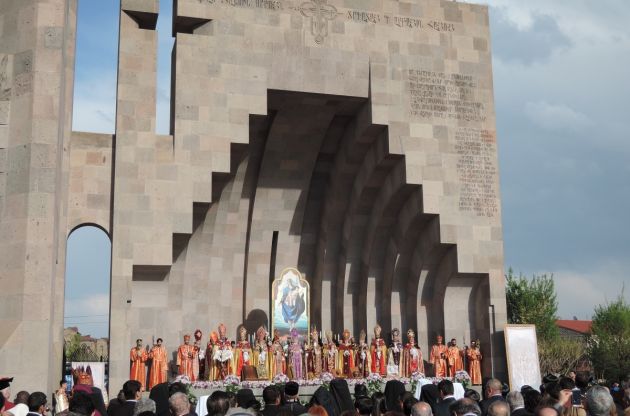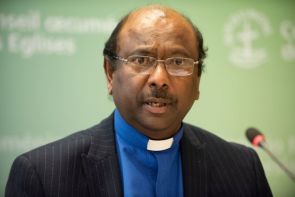Justice in Artsakh/Nagorno-Karabakh urged by world churches' body, Swiss Protestant Church

Armenian Christians are under siege with the destruction of religious, cultural, and historical heritage in Artsakh/Nagorno-Karabakh, say the World Council of Churches and the Protestant Church in Switzerland,, and they have pledged to continue fighting for justice in the area.
In partnership with the Protestant Church in Switzerland, the WCC convened the Armenian Heritage Conference on May 27 and 28 in Bern, the location of the Swiss parliament.
It was titled, "Religious Freedom: Preserving Armenian Spiritual, Cultural and Historical Heritage in Artsakh/Nagorno-Karabakh."
The WCC and the Swiss Protestant Churches issued an urgent call for immediate action to the international community at a press conference during the event.
"The destruction of Armenian sacred heritage is not only an attack on history, but on religious freedom, on human dignity, and on the values that bind humanity across traditions," said WCC secretary general Rev. Jerry Pillay in an opening speech.
"This conference is an act of moral resistance and spiritual solidarity."

Nagorno-Karabakh, also known as Artsakh by Armenians, is a mountainous region located at the southern end of the Karabakh mountain range, within Azerbaijan, according to the Reuters news agency.
It is internationally recognised as part of Azerbaijan, but until 2023 its 100,000 inhabitants were predominantly ethnic Armenians.
Rev. Rita Famos, president of the Protestant Church in Switzerland, noted at a press conference that the situation in the Artsakh/Nagorno-Karabakh region had been highlighted in the Swiss Parliament.
She urged inter-religious dialogue to reach compromises.
"From a Swiss perspective, this is significant," said Famos.
"As a neutral country with a tradition of humanitarian engagement, Switzerland can play a connecting role – bringing together different governments and encouraging them to take active responsibility," said the Swiss Protestant leader.
"That idea of using neutrality not as a position of distance, but to build bridges for concrete action," was the message of the parliamentarians.
- DIVERSE VIEWS
Famos said, "The first thing we have to learn from each other is to listen," and bring together people of diverse views.
The WCC's Pillay said, "The key thing that the World Council of Churches has always been engaged in is the awareness aspect.
"Because there are a lot of people suffering in the world that other people are not mindful of, but not only just the awareness, but also trying to establish the facts in those situations because very often distorted stories or misinformation or disinformation is communicated," said Pillay.
He said, "Awareness and advocacy is what we have always been working on," noting that the next phase is "moving government structures" and people with power and authority to be making a difference, speaking about justice and peace.
He cautioned that nationalist influences influence many churches, but noted the strong role of united churches at the same time.
If the churches lived by the Gospel consistently, they would have a huge influence, said Pillay.
"In times of polarization, it's essential that we do not become part of the division but instead act as bridges – listening, building trust, and speaking from a place of moral conviction," said the general secretary.
"We must also work together across churches, faiths, and regions. That unity gives strength and credibility. And we must be present: locally engaged, politically aware, and globally connected."
- NOT ABOUT POWER
"In the end," he said, "it's not about power – it's about persistence, compassion, and courage."
Also at the press conference were Archbishop Vicken Aykazian, vice moderator of the WCC central committee (its main governing body between assemblies); and Dr. Luis Moreno Ocampo, former first chief prosecutor of the International Criminal Court.
The predominantly Armenian-populated region of Nagorno-Karabakh was claimed by both Azerbaijan and Armenia.
Archbishop Dr Vicken Aykazian stated that the conference in Bern was a continuation of work on Artsakh/Nagorno-Karabakh, building on the efforts begun the previous year.
"We sometimes forget the power of prayer" to help bring peace to the area, he said, urging unity.
He said what is happening in the area is not only about the suffering of Armenians but also of other people, such as Kurds, and he praised the late Pope Francis for speaking out on the region.
Dr Luis Moreno Ocampo said the world should not give up in the fight against injustices.
Catholicos of All Armenians Karekin II, in his opening message, n II stressed the urgency of preserving Artsakh's spiritual, cultural, and historical legacy.
He emphasized that Artsakh's displaced people have been stripped of their right to live, create, and sustain their centuries-old faith-driven culture on their native land.
He noted that vital border territories of Armenia are under occupation and that new demands are being raised during a eace treaty process.
"Since the 44-day war of 2020 and the large-scale military operations of 2023, Artsakh has been seized and completely depopulated of Armenians," said Karekin II.
"Significant border areas of the Republic of Armenia are now occupied, and new demands are being made in peace negotiations. Azerbaijan continues to detain Artsakh's political leaders, civilians, and prisoners of war, subjecting them to staged, illegitimate trials in blatant violation of international law.
"These atrocities and humiliations are clearly rooted in ethnic hatred and Armenophobia, fueling attacks on the Armenian people's spiritual and cultural legacy," the Catholicos said.
He said that the Armenians of Artsakh had lived with dignity on their ancestral lands for centuries, faithful to their identity and enriching global culture.
Armenians, who are Christian, claim a long presence in the area, dating back several centuries, even before the birth of Christ.
Azerbaijan, whose inhabitants are predominantly Turkic Muslims, also claims deep historical ties to the region, which has been under the sway of various powers over the centuries, including the Persians, Turks, and Russians.
The bloody conflict between the two peoples goes back more than a century, according to Reuters.
Under the Soviet Union, Nagorno-Karabakh became an autonomous region within the Republic of Azerbaijan.